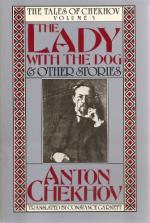|
This section contains 4,137 words (approx. 14 pages at 300 words per page) |

|
SOURCE: "Chekhov's Contribution to Realism," in Modern Drama in Theory and Practice, Volume 1: Realism and Naturalism, Cambridge University Press, 1981, pp. 81-91.
In the excerpt below, Styan views the inducement of ironic detachment in the audience as Chekhov's most important contribution to realist theater. Styan states: "It is this effect of distancing, together with the troubling relevance of his human and social themes and the elusive lyricism of his stage, which has made Chekhov an immeasurably pervasive influence on the form and style of realistic drama in the twentieth century."
The Moscow Art Theatre went on to produce the last plays of Anton Chekhov (1860-1904), each with a structure more fragile than that of The Seagull with its comparatively conventional plotting. These were Chekhov's masterpieces, Uncle Vanya (1899), Three Sisters (1901) and The Cherry Orchard (1904). Whereas Stanislavsky largely developed his thinking about the art of the theatre after Chekhov's death, it...
|
This section contains 4,137 words (approx. 14 pages at 300 words per page) |

|


